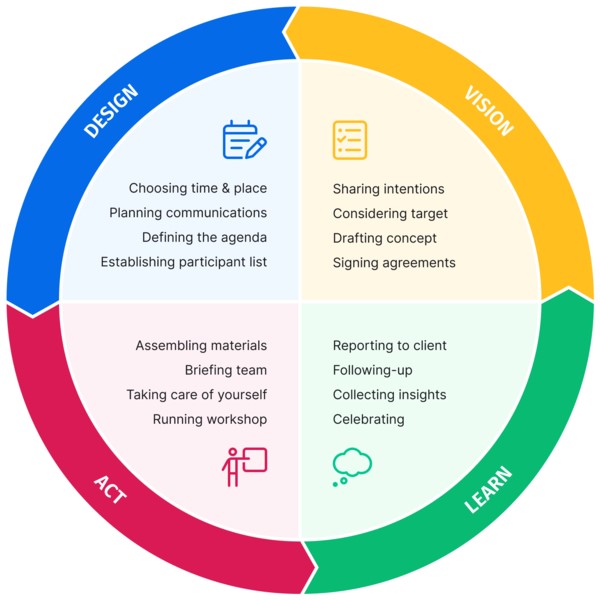
It will take you two months to prepare your ELT workshop if you begin two months before it is delivered. Planning two days will allow you to have something ready for the class in two days, and it could even turn out better than the workshop you spent two months perfecting, refining, and practicing. Teachers' seminars enhance their professional growth and sense of fulfillment in their work.
They instill a sense of competence and empowerment in instructors, which can improve their performance and work happiness. Here is everything you need to know about developing your own effective ELT workshops.
What Is A Teacher’s Workshop?
Teachers may train, be inspired, and be equipped for professional growth and development by attending a teacher's workshop. Teachers can broaden their skills by attending interesting talks on pertinent teaching subjects throughout the session.

Furthermore, workshops typically involve practical exercises on teaching methods so that educators may share knowledge. Workshop leaders can spark conversations among participants and get them working on group assignments.
We regularly share upgraded educational content, tips, feedback, and more. Check us out by clicking the profiles here - Facebook / Twitter / LinkedIn / Pinterest / Instagram / YouTube
How To Plan And Present ELT Workshops?
If you want to create engaging ELT workshops, here are a few ways to do so:
1. Be Mindful Of Your Audience
Make sure you know to whom you will be presenting before moving further. Being in a position where your excellent presentation or workshop is intended for a different audience within ELT is never going to be beneficial. You must also take into account two crucial elements when determining who your audience is. The first is their level of knowledge, and the second is their level of motivation.
Make an effort to involve them, capitalize on their expertise, and avoid speaking down to them. Be forthright and truthful about your ignorance. Make an effort to include them on a more profound level that takes into account their experience. Engaging this kind of audience can lead to satisfying results.
2. Do Your Research
Begin compiling data and conducting research. This might just be a process of outlining your views on paper, or it could entail searching online for some pertinent quotations or references from the ELT or other sectors to support your claims.
To make it easier for you to locate your research when you need it, it is recommended to organize and utilize a digital platform.
3. Organize And Evaluate
After reviewing the information, arrange the various sections that you plan to use on Post-it notes (or another online option) and begin rearrangement until you are satisfied that they make sense.
This is where digital sticky notes come in handy, and online tools and programs make this easy to do. You can also generally mentally practice what you want to say or ask people to do at each step as you are working on this.
4. Prepare Your Structure
After you've collected your ideas and research, you need to consider the organization of your work. This may be accomplished in several different ways, but before you get started, consider the following questions:
Once the preparation is complete, you can generally make a list of a few essential items and cross them off.
5. Create Your Presentation
After you are satisfied with the structure and arrangement, you can begin creating the slides for my ELT workshop or presentation. You need to make an effort to utilize pictures on the slides with a small number of bullet points rather than lengthy sentences.
It is preferable to use a picture or graphic to support your points rather than having the audience read from your slides or hear you read from them. It will be simpler to maintain their interest as a result.
6. Design Your Resources
Consider any worksheets or resources you may need once your ELT presentation or workshop is ready. Usually, you make digital versions that my audience may access using a QR code on my slide show.
In addition to saving a ton of time and paper, this also lessens the additional stress that comes with printing and distributing information. This generator is what you generally use to make my QR Codes. It's free and dependable, and you have been using it for years.
7. Think About Your Speech
Consider your remarks for each step as you move through your ELT training or presentation. Some people write cue cards or script their responses, but this only makes you more anxious because it's another thing to mess with and remember.
Consider the questions you want to pose to the audience as you work through the slides. You may ask them to consider these topics or give them tasks to complete. A good ELT workshop or presentation should interest the audience and be participatory, however they are not required to answer. It ought to assist them in thinking back on their encounters and understanding how to relate to who they are.
8. Decide The Conclusion
After your workshop, provide time for a Q&A session. Make an effort to anticipate the questions that will be asked of you and how you will respond. Prepare a few slides to address the questions that come up as you'll know what they are every time if you've done the same session several times. This will give you an air of extreme preparedness.
Include a link to download the presentation on the last slide if you would want to share it. You could also wish to include your contact information, social media links, a QR code for subscribing to your newsletter, a special offer, or a plug for a service or product if you're eager to expand your network.
Plan Your ELT Workshop With Zest
You're going to customize and develop these procedures when you begin using them to create your ELT sessions. And it should be that way. But it should be a helpful approach to get you started if you follow these instructions. If you are still curious about how to plan your own ELT workshops, an Internationally Accredited TEFL/TESOL Course in Bangalore can help you become an experienced workshop presenter.
We believe education should be accessible for everyone. That’s why we don’t charge for our blogs. Find the right course that will help you in your career with us, contact us at - 1800–212–6400. You can mail us at act@asiancollegeofteachers.com